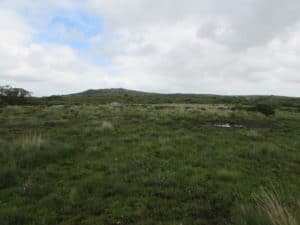Support us from £3/month
We deal with almost 1000 cases a year assisting communities, groups and individuals in protecting their local spaces and paths in all parts of England and Wales. Can you help us by joining as a member?

Grey Rock on the eastern side of the claimed common, with Helman Tor in the background
Thanks to the painstaking research of our commons re-registration officer in Cornwall, Tomas Hill, we have restored six hectares to the commons register. The land is at Trevellion Moor, on the west side of Bokiddick Downs and Lowertown Moor, a kilometre west of Helman Tor and three kilometres north of Luxulyan. The land consists of rough grassland and heath. It is already subject to a public right of access under the Countryside and Rights of Way Act 2000.
The society provided evidence that the land ought to have become finally registered under the Commons Registration Act 1965, but the commons commissioner determining the original application failed to consider whether the land qualified for registration as waste land of the manor. Because the common-land registers have been reopened in Cornwall it is possible to apply for the registration of certain land which was provisionally registered but wrongly excluded under the 1965 Act.
The landowner, the Cornwall Wildlife Trust, objected to the application and a hearing was held in October. The inspector, Mr Mark Yates, ruled that the land continued to meet the criteria for waste of the manor, ie that it was open, uncultivated and unoccupied, and therefore that it should be registered as common land.
Says Hugh Craddock, our case officer: ‘This is a welcome addition to the common-land register. Although the land is in safe hands, since it belongs to the Cornwall Wildlife Trust and there is a public right to walk there, it was wrongly omitted from the commons register and we are pleased to have restored it to its rightful legal status. Registration will ensure that any future proposals to enclose the land will be subject to public scrutiny—the society believes that it is vital that Cornwall’s wild open moors are not unnecessarily fenced off and inclosed in pursuit of conservation grazing. The inspector’s ruling, that the land does indeed still meet the definition of waste of the manor, will stand us in good stead for future applications to rectify the commons registers.’
